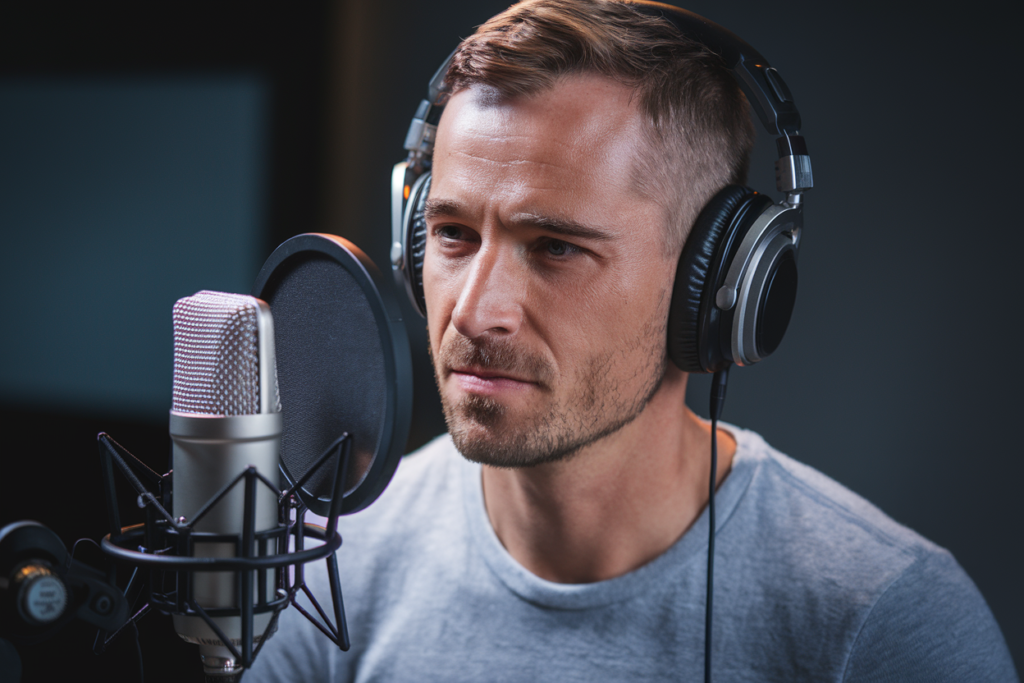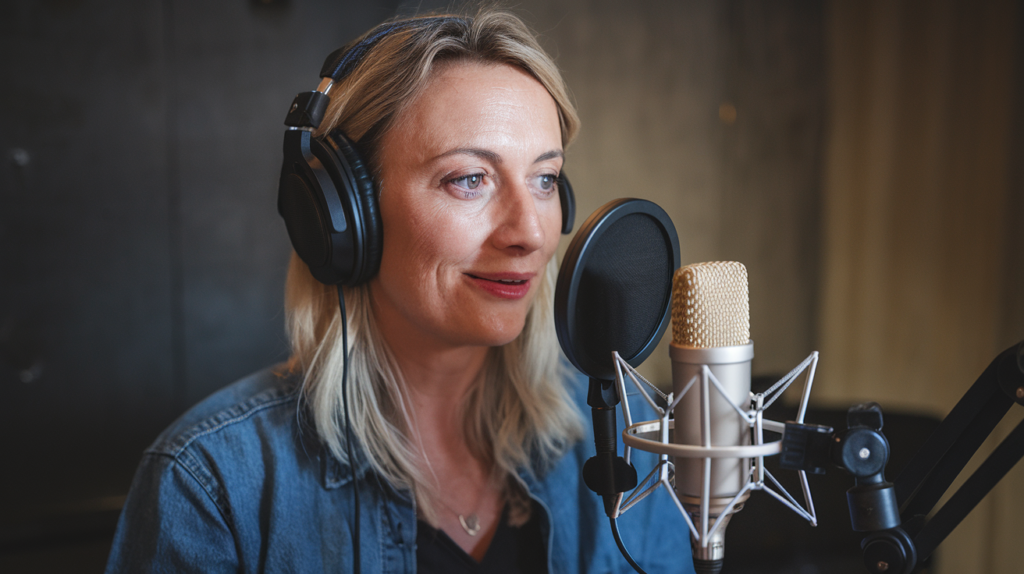Key Takeaways
- Understand Cultural Nuances: Familiarize yourself with French culture, emotional expressiveness, and regional accents to enhance communication and performance quality.
- Prioritize Preparation: Conduct thorough script analysis and character understanding to provide clear guidance and maximize the effectiveness of voice talent during recordings.
- Utilize Effective Communication Techniques: Use specific instructions and encourage creative input from voice actors to foster collaboration and enrich performances.
- Create a Positive Studio Atmosphere: Establish a calm environment that encourages creativity, while managing time effectively to ensure productive recording sessions.
- Identify Talent Strengths: Recognize each voice actor’s unique skills through auditions or previous work to tailor your direction for optimal performances.
- Adapt to Individual Styles: Embrace the distinct approaches of different voice actors, allowing flexibility in direction to achieve authentic and engaging voiceovers.
Ever wondered how to get the best performances from French voice actors? Directing talent in France comes with its own unique set of challenges and opportunities. Whether you’re a seasoned pro or just starting out, understanding the nuances of French culture and language can make all the difference.
Understanding French Voice Acting
Understanding the landscape of French voice acting is essential for directing effective performances. It involves navigating cultural nuances and language considerations that shape how voice actors deliver their lines.
Cultural Nuances
Cultural context plays a significant role in voiceover work. French culture values emotional expressiveness, subtlety, and a certain rhythm in speech. Familiarizing yourself with these traits can enhance your communication with voice actors. For instance, humor often differs across cultures; what’s funny in one context may not translate well into another. You might find it beneficial to reference popular French media or literature during sessions to bridge any cultural gaps.
Additionally, recognizing regional accents adds depth to your direction. France boasts diverse dialects that can influence character portrayal significantly. Engaging in discussions about local customs or idiomatic expressions can create a more comfortable environment for the talent, allowing them to deliver authentic performances that resonate with audiences.
Language Considerations
Language intricacies impact every aspect of voiceover projects. Mastering pronunciation and intonation specific to the French language is crucial for achieving convincing results. Encourage voice actors to embrace the lyrical quality of French while conveying emotion through tone variation.
When working on scripts, consider vocabulary choice carefully; some words carry different connotations based on context or region within France. Providing clear guidance on desired emotional undertones will help actors align their interpretations with your vision.
Directing non-native speakers? Focus on articulation and pacing; they may require extra support mastering complex phrases or maintaining fluidity throughout longer passages. Clear communication fosters a collaborative atmosphere where creative ideas flourish, ensuring that final recordings reflect both linguistic accuracy and artistic intent.
By delving into these elements of understanding French voice acting, you position yourself as an informed director capable of guiding talent toward outstanding voiceovers tailored perfectly for your project needs.
Preparation for Directing
Preparation plays a critical role in the success of directing French voice actors. Understanding the nuances of the script and characters enhances your ability to guide voice talent effectively.
Script Analysis
Script analysis involves breaking down the material to understand themes, character arcs, and emotional undertones. Review each line carefully, considering how language and cultural context influence delivery. Identify key moments that require heightened emotion or subtlety, as these often define a character’s essence. Highlight specific phrases that may need clarification or emphasis during recording sessions. This level of detail allows you to provide precise direction when working with voice artists.
Understanding Character Voices
Understanding character voices is essential for directing effective performances. Each character brings unique traits that should resonate through vocal choices. Think about their backgrounds, motivations, and relationships with other characters—these elements inform how they express themselves verbally. Consider conducting pre-session discussions with your voice actors to explore their interpretations of roles; this collaborative approach fosters creativity and leads to richer outcomes in voiceovers. Encourage them to experiment with different tones and styles until they find what best fits the character’s personality within the story’s framework.
By prioritizing thorough preparation in script analysis and character comprehension, you enhance your capability to direct voice over talent confidently during recordings in France.
Communication Techniques
Effective communication is crucial when directing French voice actors. It enhances collaboration and fosters an environment where creativity thrives.
Using Clear Instructions
Clear instructions set the stage for successful performances. Be specific about what you want from the voice actor, including tone, pace, and emotional delivery. When providing direction, use straightforward language that resonates with their understanding of the script. For instance, instead of saying “make it more lively,” specify “use a bright tone to convey excitement.” This clarity helps voice talent grasp your vision quickly.
Consider preparing a reference track or example to illustrate your expectations. Hearing a sample can bridge any gaps in understanding and guide them toward the desired performance. Always encourage questions; this openness ensures that everyone is on the same page.
Encouraging Creative Input
Inviting creative input transforms sessions into collaborative efforts. Voice actors bring unique perspectives and interpretations to characters—embracing these insights often leads to richer performances. Ask them how they envision their character’s emotions or motivations; this can unlock new layers in their delivery.
Create an atmosphere where feedback flows freely. Affirmative comments boost confidence while constructive criticism guides improvement without discouragement. Remember that striking a balance between guidance and freedom allows for organic expression, which often results in memorable voiceovers.
By mastering these communication techniques, you cultivate a productive relationship with French voice actors that elevates every project you undertake together.
Directing in the Studio
Directing voice actors in a studio setting requires careful attention to detail and an understanding of the unique dynamics at play. Creating an environment that encourages creativity and confidence can significantly impact the quality of your recordings.
Setting the Right Atmosphere
Establish a calm and inviting atmosphere. Comfortable surroundings help voice actors feel relaxed, allowing them to deliver their best performances. Use soft lighting and avoid cluttered spaces to minimize distractions. Consider playing subtle background music or sounds that align with the project’s theme; this can enhance focus while fostering creativity.
Encourage open communication from the start. Share your vision clearly but remain receptive to input from voice talent; their insights often lead to unexpected gems in performance. Create a space where feedback feels constructive rather than critical, making it easier for artists to explore different interpretations without fear of judgment.
Foster collaboration by engaging with your voice artists during breaks or casual chats about character motivations or script nuances. This rapport builds trust and helps them connect more deeply with their roles, resulting in richer performances.
Managing Time Effectively
Effective time management is crucial during recording sessions. Start by establishing a clear agenda for each session, detailing specific objectives you want to achieve with each take or scene. Prioritize sections based on complexity, allowing extra time for challenging lines or emotions that require fine-tuning.
Utilize technology like timers or scheduling software to keep track of progress against your planned timeline. Regularly check in with both yourself and your voice over talent regarding pacing; if certain sections take longer than expected, adjust accordingly without compromising on quality.
Set aside time for rehearsals before recording begins; this allows everyone involved—directors and voice actors alike—to warm up into character without feeling rushed under pressure. If something doesn’t feel right during those initial takes, don’t hesitate to pause and reassess what might work better instead—you’ll save valuable time later by ensuring you capture optimal performances upfront.
By focusing on creating an inviting atmosphere and managing time effectively, you maximize productivity while enhancing the overall experience for everyone involved in bringing characters to life through voiceovers.
Working with Different Voice Actors
Directing voice actors in France requires a keen understanding of their unique talents and styles. Each voice artist brings something different to the table, so recognizing these distinctions enhances your project’s outcome.
Identifying Talent Strengths
Identifying each actor’s strengths forms the foundation of effective direction. Observe their previous work; listen closely to how they convey emotions through tone and delivery. Some voice actors excel at dramatic roles, while others shine in comedic performances. By pinpointing these strengths early on, you can tailor your guidance during recordings, maximizing the potential for an outstanding voiceover.
Consider conducting short auditions or sample reads before finalizing casting choices. This practice not only showcases their abilities but also helps establish a rapport between you and the voice talent. Building this connection fosters trust and encourages open communication throughout the recording process.
Adapting to Individual Styles
Adapting to each voice actor’s individual style is crucial for achieving authentic performances. Every artist has a unique approach to interpreting scripts, so flexibility in direction leads to better outcomes. Embrace the nuances that come with different voices; some may favor a more subtle delivery, while others might prefer heightened expressiveness.
Encourage actors to explore various interpretations of their lines during rehearsals. This exploration allows them to infuse personal flair into their performances while aligning with your vision for the project. Remember, collaboration often yields surprising results that enhance storytelling through voiceovers.
Incorporate feedback sessions as part of your workflow—asking for input from your cast can unearth new ideas or perspectives you hadn’t considered before. Being receptive to their suggestions creates an environment where creativity thrives and elevates overall performance quality.
By identifying strengths and adapting to individual styles, you position yourself as an effective director who fosters incredible collaborations with French voice actors.
Conclusion
Directing French voice actors offers a unique blend of challenges and rewards. By embracing the nuances of culture and language you can foster genuine performances that resonate with audiences. Preparation is key so take time to understand your script and characters deeply.
Clear communication builds trust and encourages creativity among voice actors. Make sure to provide specific direction while remaining open to their insights. Creating a comfortable studio environment enhances collaboration leading to exceptional results.
Ultimately your ability to adapt to each actor’s style will elevate the quality of your project. With these tips in mind you’re well-equipped to navigate the world of French voice acting successfully.
Frequently Asked Questions
What are the main challenges in directing French voice actors?
Directing French voice actors presents unique challenges, such as navigating cultural nuances, regional accents, and language intricacies. Understanding emotional expressiveness and subtlety in speech is crucial for effective communication. Additionally, directors must be mindful of pronunciation and intonation specific to the French language to achieve authentic performances.
How can directors prepare for working with French voice actors?
Preparation involves thorough script analysis to grasp character arcs and themes. Directors should understand each character’s traits and engage in pre-session discussions with voice actors to explore interpretations. This preparation fosters creativity and leads to richer voiceover outcomes tailored to project needs.
Why is effective communication important when directing French voice actors?
Effective communication ensures that voice actors understand the director’s vision regarding tone, pace, and emotional delivery. Clear instructions help bridge understanding gaps, while encouraging questions fosters collaboration. Inviting creative input from actors enhances performances by leveraging their unique perspectives.
What role does studio atmosphere play in directing voice actors?
Creating a calm and inviting studio atmosphere encourages creativity and confidence among voice actors. Minimizing distractions and fostering open communication builds trust. Engaging with artists during breaks further deepens their connection to roles, leading to better overall performances.
How can directors manage time effectively during recording sessions?
Establishing a clear agenda is crucial for effective time management during recording sessions. Prioritizing complex sections allows for focused efforts while utilizing technology helps track progress. Setting aside rehearsal time enables everyone to warm into character, ensuring optimal performance captures throughout the session.
What should directors consider when working with different voice actors?
Understanding each actor’s unique talents and styles is essential for effective direction. Conducting short auditions helps establish rapport, while adapting direction based on individual strengths promotes authenticity in performances. Encouraging exploration of various interpretations fosters collaboration and unearths new ideas during rehearsals.







